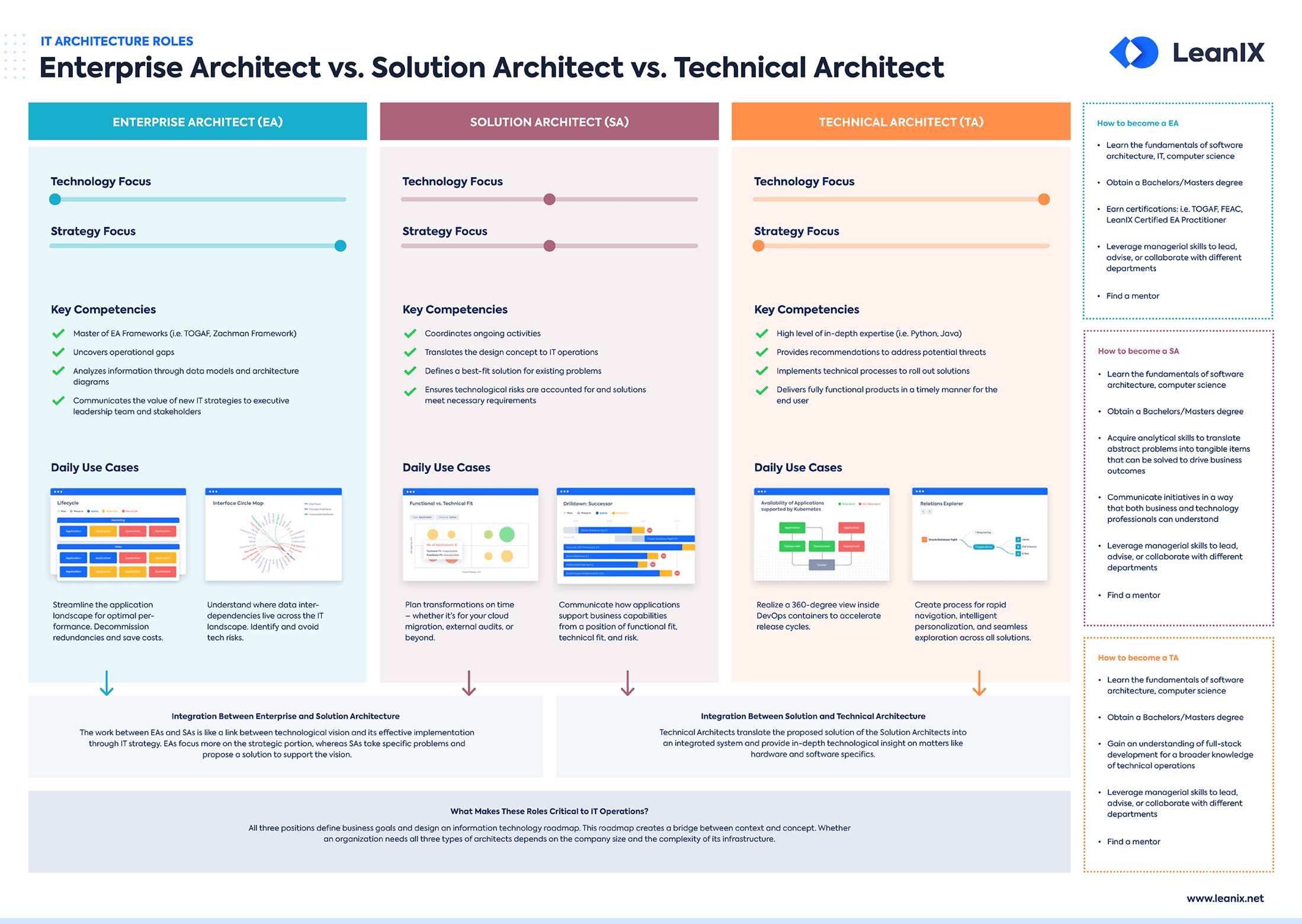Different Architects
 Source: Enterprise Architect vs. Solution Architect vs. Technical Architect
Source: Enterprise Architect vs. Solution Architect vs. Technical Architect
Different Architects
Enterprise Architect
Enterprise architects have the most overarching view of the organization and know of its capabilities and potentials. They play a key role when it comes to identifying business needs in context with external factors like competitors and internal factors like a company’s IT landscape. They are in charge of analyzing current trends in technology architecture and educating technology departments about new frameworks and best practices.
Through the use of clear architectural models and the help of domain architects, they define business goals and design an information technology roadmap. This roadmap is supposed to create a bridge between context and concept.
Solution architects
Solution architects are responsible for finding and implementing solutions for specific business problems. The solution architect bridges the gap between concept and implementation by acting as a channel between enterprise architecture and technical architecture. They translate the design into a concept for IT operations.
Solution Architects are most similar to project managers, ensuring that all parties, including stakeholders, are on the same page and moving in the right direction at all stages.
Technical Architect
Technical architects manage all activities leading to the successful implementation of a new application. They are specialists in their field and must be able to first visualize new technical concepts and then implement them into an existing system.
They focus on a specific technology and provide the technological know-how required to deliver the product. It is their responsibility to implement the IT project with a development team, defining best practices and standards. In addition, they inform all those involved about specific software requirements and the associated risks. Ideally, the technical architects are experienced in dealing with local and cloud-based infrastructures and know how to use an application most effectively.
Most technical architecture specialists focus on one single implementation and specialize in a particular domain where they also define best practices.
The technical architect’s main task is to realize particular technical implementation processes. As this requires a high level of in-depth expertise, technical architects usually specialize in one single technology. Thus, they are named according to their area of knowledge, for example, Java or Python architect. Just like data, application, or information architects, technical architects fall under the umbrella of domain architects.
Solutions Architect
Why Solutions Architects Exist
The rise of 'buy over build' approaches in tech for enterprises has necessitated the existence of Solutions Architects (SAs). They cater to the technical needs of big companies, offering Infrastructure-as-a-Service (IAAS), Platform-as-a-Service (PAAS), and Software-as-a-Service (SAAS) solutions. These services streamline operations, enhance scalability, and integrate various enterprise systems.
Solutions Provided
- IAAS: Cloud providers like AWS, Azure, and GCP offer infrastructure services, eliminating the need for in-house maintenance.
- PAAS: Providers like Snowflake and Databricks build custom solutions, relieving companies from infrastructure management.
- SAAS: Innovative solutions, like those from ServiceNow and Datadog, cater to diverse organizational needs.
Role and Responsibilities
Solutions Architects work closely with Account Teams, aiding in the explanation and sale of company products. They handle presentations, proposal responses, and stakeholder management, acting as a bridge between technical and non-technical audiences.
Key Tasks
- Discovery: SAs conduct in-depth calls with prospects, understanding their challenges to align product offerings effectively.
- Product Demos: Customized demos showcase how solutions address customer needs, covering both functional and technical aspects.
- Solution Sizing: SAs help determine the necessary capacity for successful product implementation.
- External Events: They participate in customer/partner-facing events, demonstrating product benefits.
Specializations in Solutions Architecture
Solutions Architects operate across various segments: SMB, Mid-market, Enterprise, and Partner SAs, each handling different customer sizes and engagement levels. Some specialize in specific areas like Data Engineering or Cloud Architecture.
Career Path
The career trajectory for SAs offers progression both as Individual Contributors and within Management. Advancement paths vary, ranging from Enterprise SA positions to managerial roles, based on expertise and experience.
An SA role suits those inclined toward technology but not necessarily coding. Success in this role relies on a blend of technical knowledge and customer-oriented skills, such as effective communication and strategic problem-solving abilities.
This role not only demands a deep understanding of product technology but also requires aligning those capabilities with customers' strategic goals, making it a rewarding career choice for tech enthusiasts with strong interpersonal skills.